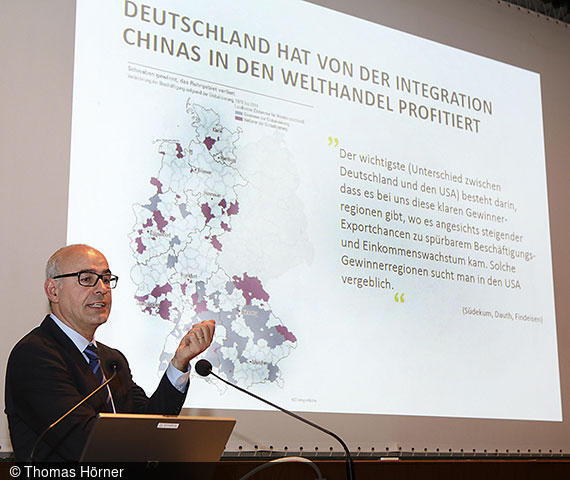ZEW President Wambach at Podium Discussion on Economic Growth in China: Too Stable to Be True?
EventsWhat kind of growth might we see in China’s economy in the short to medium term? Will the Chinese economy be able to continue this success in the long term? What reforms are necessary to cushion the effects of social upheaval? These were just some of the questions addressed by prominent experts from the worlds of politics, economics and research in a podium discussion on 26 June 2017. ZEW welcomed more than 100 guests to the event, which was held in collaboration with the Baden Württemberg Ministry of Economic Affairs, Labour and Housing at the Haus der Wirtschaft in Stuttgart.
Whether the Chinese economy booms or falters, the effects can clearly be felt not only in Europe and Germany but in the State of Baden-Württemberg as well. In her opening address, Dr. Nicole Hoffmeister-Kraut MdL, Minister of Economic Affairs, Labour and Housing in Baden-Württemberg underlined the far-reaching significance of China for companies based in Baden-Württemberg. China has become the fifth most important trading partner for the federal state and, thanks to China’s increased focus on investment in innovation as part of its economic policy, we can expect Baden-Württemberg-based companies to continue to expand their commercial activities in China.
China needs long-term economic growth through innovation policy
ZEW President Professor Achim Wambach used his keynote speech to address current developments in the Chinese economy, in particular medium and long-term growth projections as well as trade relations and the nation’s focus on innovation. Though China is still one of the fastest growing economies in the world, the weakening of this growth in recent years has not only had a negative impact on the Chinese economy itself but on foreign economies as well, including German companies. This is what makes the new direction of the Chinese economy as well as innovation activities of Chinese companies so exceptional. While China’s recovery is being primarily driven by the uptake of well-known technologies, at the same time stable economic growth demands a continual increase in efficiency and innovations.
The experts discuss necessary reform measures
In the podium discussion that followed, ZEW President Wambach was joined on stage by Minister Dr. Nicole Hoffmeister-Kraut, Dr. Thomas Hueck, chief economist at Robert Bosch, Bettina Schön-Behanzin, regional president of the Freudenberg Group in Asia and President of AHK Shanghai, and Dr. Volker Treier, foreign business chief at the German Industry and Trade Association (DIHK). The subject of the debate was the opportunities and risks associated with economic growth in China as well as a number of reform measures necessary to cushion the effects of social upheaval and ensure long-term economic growth and stability. The discussion was moderated by Peter Heilbrunner, head of SWR1 radio.
Another topic of the debate was the investment strategies of Chinese firms, which have been buying up large numbers of innovative overseas firms, including firms in Germany. Chinese restrictions on market access for foreign companies as well as other forms of regulation in the Chinese market were also discussed, as were ways for small and medium-sized German companies to gain a foothold in China. All of the panellists were quick to agree, however, that the comparison of China today with the German economy 50 years ago was an apt one. A number of the realities people complain about with regard to China today were present back then in Germany, where the economy also only gradually opened up to foreign trade. It was all a question of future developments in China’s economy, such as the country’s recent initiative to open a “new silk road” and the opportunities this could bring for both China and Germany and the rest of the world.
